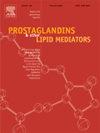探索17β-雌二醇缺乏和替代的多种信号机制:对绝经后实验模型认知功能障碍的影响
IF 2.5
3区 生物学
Q3 BIOCHEMISTRY & MOLECULAR BIOLOGY
Prostaglandins & other lipid mediators
Pub Date : 2025-07-15
DOI:10.1016/j.prostaglandins.2025.107024
引用次数: 0
摘要
本研究旨在探讨绝经期雌二醇缺乏影响的途径,以及17β-雌二醇替代如何改变这些途径,以减轻与绝经相关的变化,特别是与痴呆风险相关的认知功能和神经炎症。将40只雌性白化大鼠分为4组:对照组、假手术组、卵巢切除组和17β-雌二醇治疗组。使用莫里斯水迷宫的认知测试评估空间学习和记忆,同时通过高效液相色谱分析神经递质水平。采用ELISA法检测血清雌激素、NGF、Aβ、PSD-95水平。RT-PCR检测Cx43、LRP、RAGE的表达,免疫组化检测芳香化酶的表达。结果表明,雌激素缺乏导致OVX大鼠认知、神经递质信号和神经营养因子的显著损伤。NGF减少和PSD-95水平改变表明神经元健康和突触可塑性受损。芳香化酶表达的增加反映了局部雌激素合成的减少,可能导致认知缺陷。RAGE上调和LRP表达改变提示炎症和神经退行性过程,而Cx43表达降低和Aβ加工改变提示细胞间通讯受损。总的来说,研究结果强调了雌激素缺乏对脑功能的有害影响,并表明17β-雌二醇替代可能减轻与更年期相关的认知能力下降和神经炎症。本文章由计算机程序翻译,如有差异,请以英文原文为准。
Exploring the diverse signaling mechanisms of 17β-estradiol deficiency and replacement: Impacts on cognitive dysfunction in a post-menopausal experimental model
This study aimed to investigate brain signaling mechanisms affected by estradiol deficiency during menopause and how these pathways are modified with 17β-estradiol replacement to mitigate menopause-related changes, particularly in cognitive function and neuroinflammation, which are linked to the risk of dementia. Forty female white albino rats were divided into four groups: control, sham, ovariectomized (OVX), and OVX rats treated with 17β-estradiol. Cognitive tests using the Morris Water Maze assessed spatial learning and memory, while neurotransmitter levels were analyzed via HPLC. Serum levels of estrogen, Nerve Growth Factor (NGF), amyloid precursor protein(Aβ), and Postsynaptic Density Protein 95 (PSD-95) were measured using ELISA. Additionally, RT-PCR was used to evaluate the expression of gap junction protein connexin-43 (Cx43), Lipoprotein receptor-related protein (LRP1), and receptor for advanced glycation end products (RAGE), and aromatase expression was assessed via immunohistochemistry. Results showed that estrogen deficiency in OVX rats led to significant impairments in cognition, neurotransmitter signaling, and neurotrophic factors. Reduced NGF and altered PSD-95 levels indicated compromised neuronal health and synaptic plasticity. Increased aromatase expression reflected reduced local estrogen synthesis, potentially contributing to cognitive deficits. Upregulated RAGE and altered LRP1 expression suggested inflammatory and neurodegenerative processes, while decreased Cx43 expression and modified Aβ processing indicated impaired intercellular communication. Overall, the findings highlight the detrimental effects of estrogen deficiency on brain function and suggest that 17β-estradiol replacement may mitigate menopause-related cognitive decline and neuroinflammation.
求助全文
通过发布文献求助,成功后即可免费获取论文全文。
去求助
来源期刊

Prostaglandins & other lipid mediators
生物-生化与分子生物学
CiteScore
5.80
自引率
3.40%
发文量
49
审稿时长
2 months
期刊介绍:
Prostaglandins & Other Lipid Mediators is the original and foremost journal dealing with prostaglandins and related lipid mediator substances. It includes basic and clinical studies related to the pharmacology, physiology, pathology and biochemistry of lipid mediators.
Prostaglandins & Other Lipid Mediators invites reports of original research, mini-reviews, reviews, and methods articles in the basic and clinical aspects of all areas of lipid mediator research: cell biology, developmental biology, genetics, molecular biology, chemistry, biochemistry, physiology, pharmacology, endocrinology, biology, the medical sciences, and epidemiology.
Prostaglandins & Other Lipid Mediators also accepts proposals for special issue topics. The Editors will make every effort to advise authors of the decision on the submitted manuscript within 3-4 weeks of receipt.
 求助内容:
求助内容: 应助结果提醒方式:
应助结果提醒方式:


